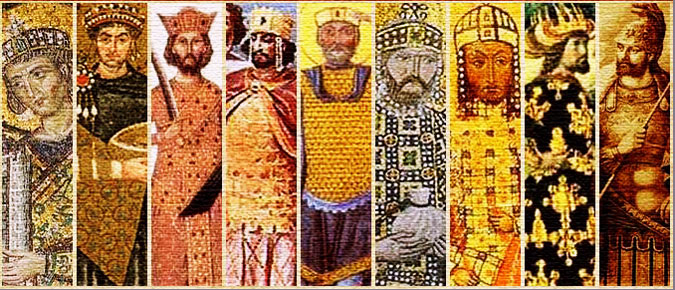The Purpose The "Byzantine Chronicle" web site (www.byzantium.xronikon.com), is a short guide and a quick reference to the emperors of Byzantium.
This site is not about the history of the Byzantium, in general. It is, specifically, about the Byzantine Emperors. It focuses on the emperors and gives basic information about them.
Byzantium The terms "Byzantine Empire" and "Byzantium" are conventionally used to describe the Greek-speaking Eastern Roman Empire during the Middle Ages, centred at its capital in Constantinople.
These terms derive from the original Greek name for Constantinople; Byzantion. The name is ancient, but the Byzantines themselves never used the terms "Byzantine" and "Byzantium", at least not with the meaning that they have today.
The term "Byzantine" was invented in 1557, about a century after the fall of Constantinople, by the German historian Hieronymus Wolf, who introduced it in his work Corpus Historiae Byzantinae in order to distinguish ancient Roman from medieval Greek history.
The Byzantine Epoch The end of the Byzantine empire came on the 29th May 1453.
This is quite clear.
There is no consensus, however, on the starting date of the Byzantine period.
Usually, the story of Byzantium starts with Constantine the Great. Some sources place it during the reign of Theodosius I (379-395) and the triumph of Christianity, or with the division of the empire into Western and Eastern parts after his death. Others place it yet further in 476, when the last western emperor, Romulus Augustus, was forced to abdicate, thus leaving to the emperor in the Greek East sole imperial authority.
Other proposed starting points are the reigns of Diocletian (284-305), of Justinian and of Heraklios.
The fact is that the process of Hellenization and Christianization, which transformed the Roman Empire into the Byzantine one, started gradually in the days of Diocletian, was dramatically advanced by the decisions of Constantine the Great, was accelerated after Theodosius I and was concluded during the reign of Heraklios
In this site, we follow the most common assumption: Byzantium begins in 330 A.D., the year that Constantinople became the new capital of the Roman Empire.
So, the chronology of the site covers the period 330 to 1453: A total of 1123 years.
Saturday, July 11, 2015
Byzantine Chronicle
Byzantine Chronicle
Subscribe to:
Post Comments (Atom)










 Stumble It!
Stumble It!

No comments:
Post a Comment